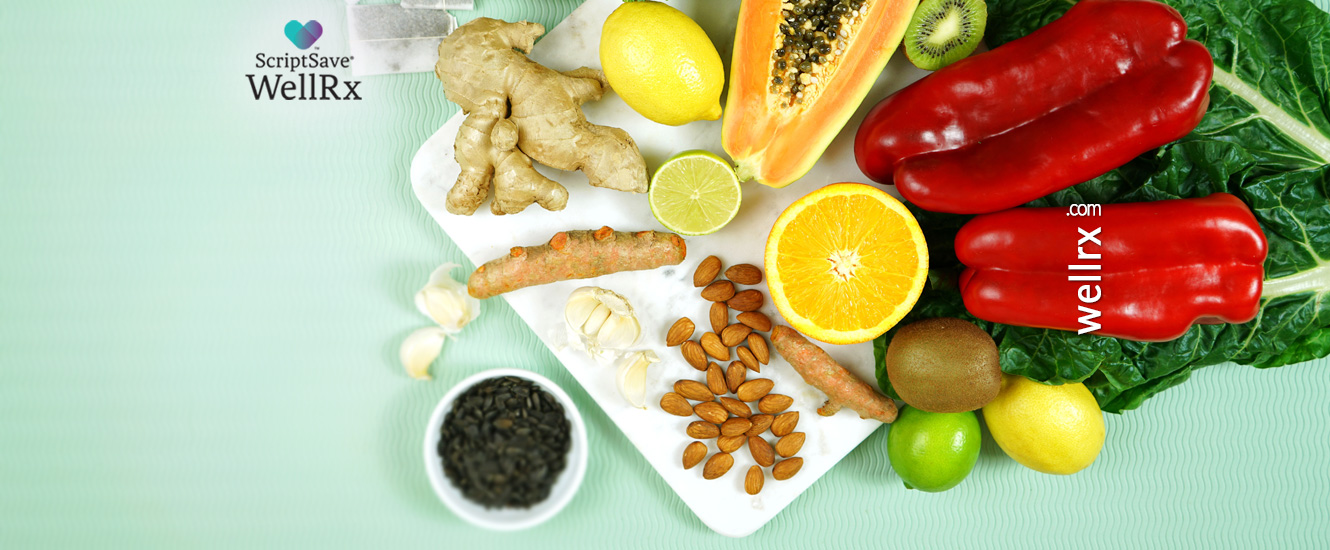COVID-19 rates are continuing to rise throughout the country, and with vaccine distribution just beginning, it’s more important than ever to take good care of your immune system. While everyone should continue to reduce the risk of transmission by wearing masks and maintaining social distance as much as possible, you can take steps to reduce your risk of becoming infected should you come into contact with someone who has COVID19. These steps include tried-and-true health recommendations, such as eating a healthy diet and exercising, along with some specific vitamins and supplements that can help boost the immune system.
1. Eat a Healthy Diet
Eating a healthy diet is one of the most important steps you can take to improve your immune system function and overall health. It’s important to eat a variety of foods that are high in essential nutrients because studies show that certain nutrient deficiencies suppress immune function.
Research indicates that only 9% of adults meet the guidelines for fruit and vegetable consumption. During times of stress, it can be particularly easy to turn toward “comfort foods” that are high in fat, sugar, and refined carbohydrates.
Look for ways to swap out some of the foods you are currently eating with fruits or vegetables. Riced cauliflower is a great substitute for rice, and spaghetti squash can be used in place of pasta. Instead of eating sugary cereals or pastries for breakfast, make a fruit-filled smoothie. You can even add a few handfuls of spinach to a smoothie without affecting the taste much.
2. Focus on These Essential Vitamins and Nutrients
Some of the most important nutrients for immune system health are vitamin A, vitamin C, vitamin E, vitamin D, zinc, and selenium.
When adding more fruits and vegetables to your diet, aim for a variety of foods in different colors, which will provide you with different nutrients. Orange foods, such as carrots, sweet potatoes, and apricots are a good source of vitamin A. Vitamin C can be found in citrus fruits, berries, cherries, and leafy greens like spinach and kale. Nuts, avocados, and salmon are a good source of vitamin E.
Vitamin D deficiencies are very common. Our bodies produce vitamin D when our skin is exposed to sunlight, and most people—even those who live in sunny climates—don’t get enough sun exposure to produce adequate levels of vitamin D. The recommended daily intake for vitamin D is 600 international units (IU) for adults, but some medical professionals believe this is too low. Some studies suggest a daily intake of 4000 IU or even higher is necessary to maintain optimal blood levels. Check with your doctor to see what is appropriate for you.
Selenium is an essential mineral and an antioxidant. Brazil nuts, seafood, and organ meats are all good sources.
Low levels of zinc have been linked to poor COVID-19 outcomes. In a retrospective study of COVID-19 patients, patients with zinc deficiency had higher mortality rates. Foods high in zinc include beef, chicken, pork, chickpeas, lentils, hemp seeds, pumpkin seeds, cashews, and eggs.
If your diet is low in any of these nutrients, you may want to consider taking supplements. Some important nutrients are simply hard to get in adequate quantities from food. While supplements should never be a substitute for a healthy diet, they can fill in the gaps.
3. Exercise Regularly
Medical research is showing that regular exercise can potentially prevent or at least reduce the severity of acute respiratory distress syndrome, which is a major complication in patients with COVID-19.
In addition, exercise is a great form of stress relief. If you’re feeling tired and overwhelmed, it can be difficult to motivate yourself to move more, but doing so can help to reframe how you think about exercise. You don’t have to spend an hour on the treadmill. A walk around the block in the evening counts, as does a relaxing yoga session before bed. Try to spend less time sitting during the day if possible. If you work a desk job, simply switching to a standing desk is a great way to be less sedentary.
4. Improve Your Digestive Health
The importance of a healthy digestive tract cannot be overstated. Nearly 70% of the immune system is in the gastrointestinal tract. Making sure your digestive system is functioning properly is an important part of strengthening your immune system and maintaining your overall health.
Eating a healthy diet, finding ways to manage stress, and drinking lots of fluids can help improve your digestive system, but that may not be enough for most people. Many people have imbalances in their microbiome—the bacteria in the gut. We tend to think of all bacteria as bad, but some bacteria are beneficial; they help you digest the food you eat and fight off pathogens. Foods such as yogurt and kombucha contain healthy bacteria. If you tend to have digestive issues, you may also benefit from taking a probiotic supplement to help replenish the healthy bacteria in your gut.
Karen Eisenbraun is a Certified Holistic Nutrition Consultant. She holds an English degree from Knox College and has written extensively about topics related to holistic health, clinical nutrition, and weight management.
References:
https://www.ncbi.nlm.nih.gov/pmc/articles/PMC6723551/
https://www.cdc.gov/media/releases/2017/p1116-fruit-vegetable-consumption.html
https://www.news-medical.net/news/20201012/Zinc-deficiency-linked-to-poor-COVID-19-outcomes.aspx
https://newsroom.uvahealth.com/2020/04/15/covid-19-exercise-may-help-prevent-deadly-complication/













 Store & manage your medication list
Store & manage your medication list Medication pricing updates
Medication pricing updates Pill & refill reminders
Pill & refill reminders Medication journal & mood log
Medication journal & mood log